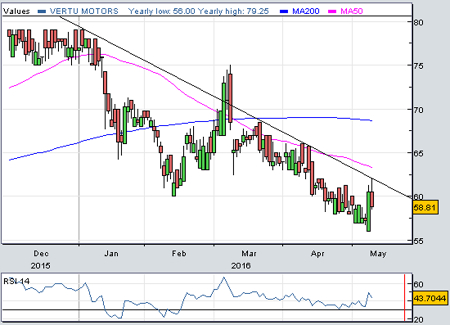Vertu Motors stuck in reverse gear
11th May 2016 17:45
With its acquisitions team picking top-quality assets and record profit growth, should be in the fast lane. However, concerns about the EU referendum and sustainability of economic growth have wiped out 26% of the car dealer's value in the past five months, and the shares are now worth less than they listed at a decade ago.
Sales jumped 17% to £2.4 billion in the year to 29 February, but tighter control of costs means profit is growing faster and the pre-tax measure jumped 24% to a record £27.4 million, giving earnings per share (EPS) of 6.06p.
Operating inflow was up 150% at £65.8 million thanks to lots more reclaimed VAT. Vertu ended the period with £23.1 million of net cash, up by nearly half and supporting a 24% jump in the dividend to 1.3p.
Vertu's business model revolves around acquisitive growth: Vertu spent around £25 million on 16 dealerships last year. Expanding its premium business, Audi, Mercedes-Benz and Jaguar dealerships were added to its portfolio, although it still has a strong foothold in the less expensive brands like Ford, Hyundai and Honda.
With the UK car retail sector still heavily fragmented, there are lots of opportunities for Vertu to spend the £35 million it raised in March's share placing at 62.5p - one buy is in the bag, expect some news in the next couple of weeks.

No flash in the pan
Growth at the aftersales business - including car service and MOT - has accelerated, with the number of customers paying each month rocketing from 9,000 five years ago to 90,000 today. As retention has grown from 20% to 45%, it generates a 77% margin. Accounting for just 7.8% of revenue at £189 million, it generated 39% of gross profit at £103 million.
"This isn't just a flash in the pan, this growth has been like this for four or five years," chief executive Robert Forrester explained to Interactive Investor Wednesday. “That provides us with great resilience, because that growth in aftersales will continue - it's baked in, basically.”
Used cars is the second most profitable part of the group, generating nearly 32% of gross profit, and while new car sales bring in the highest proportion of revenue at £1.4 billion, £76.9 million of profit is just 29.2% of the group total.
A new marketing drive focusing on TV rather than print is also paying off. Although the group spent £2 million more on advertising than last year, it made an extra £3.8 million on used cars, a good chunk of which was made in the second half: "we did well", qualifies the boss.
Liberum has pencilled in sales growth to £2.7 billion in 2017, with adjusted pre-tax profit leaping to £31 million, both up 12%. The shares are still trading below their 60p IPO price and Liberum reckons EPS of 8p is possible. That would put the shares on a price/earnings (PE) multiple of under 8 times, a 20% discount to its peers. Cheap, then.
Non-executive director Ken Lever certainly thinks so. He wasted no time in picking up £25,000 worth of Vertu shares at 61.23p a pop. With another record year under its belt and with promising start to the new year, Vertu is proving that it can deliver. So why did the shares fall as much as 4% Wednesday?
Impact of Brexit
Acknowledging the uncertainty surrounding next month's EU referendum, Vertu stays tight-lipped over any potential impact a 'Leave' decision would have on the business. Clearly, the vote is weighing on investor’s minds, though.
"I think it's a combination of [Brexit] uncertainty and the fact that the industry has come so far that creates nervousness with investors," Zeus Capital analyst Mike Allen told us. "Some investors like it, they can see the business delivering and supported, but there are investors out there that are nervous about the cyclical nature of the market."
While aftersales are a good defensive play to guarantee customers return in two or three years, the negative impact leaving the EU could have on currency could leave the car market in tatters.
If sterling plunged against the euro, European manufacturers would be deterred from selling stock in the UK market as it wouldn't be as profitable. On the other hand, a vote to 'remain' could cause the pound to rocket, which may lead to a flood of stock on the market due to its high profitability.
Still, if the UK does turn its back on the continent, the hundreds of thousands of cars German manufacturers ship to the UK each year will not dry up overnight. Allen reckons trade agreements would be signed pretty quickly, too.
"I don't think it would be good for the industry but that doesn't mean that the 700,000 German cars alone that come to the UK would turn to zero," he adds.
This article is for information and discussion purposes only and does not form a recommendation to invest or otherwise. The value of an investment may fall. The investments referred to in this article may not be suitable for all investors, and if in doubt, an investor should seek advice from a qualified investment adviser.
Editor's Picks